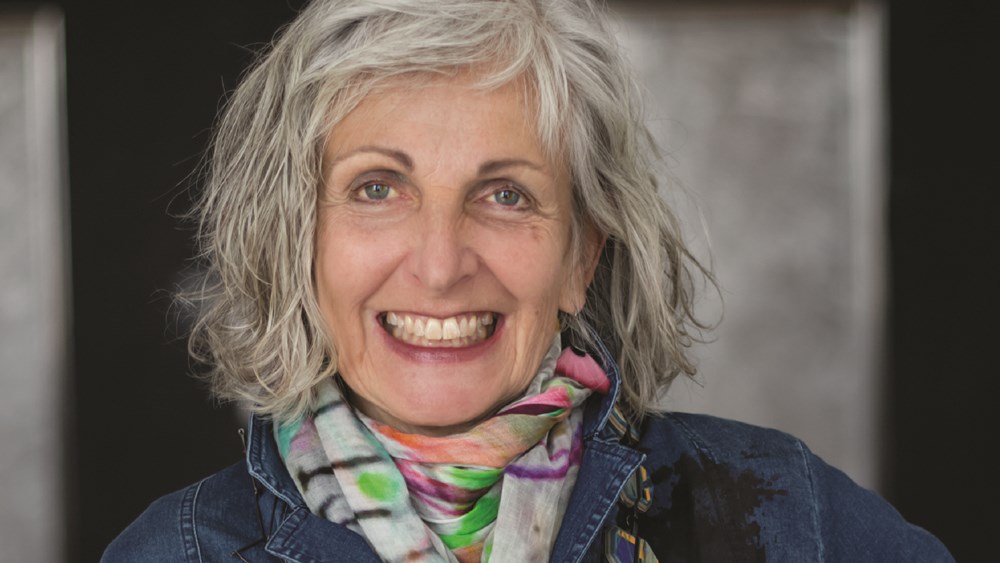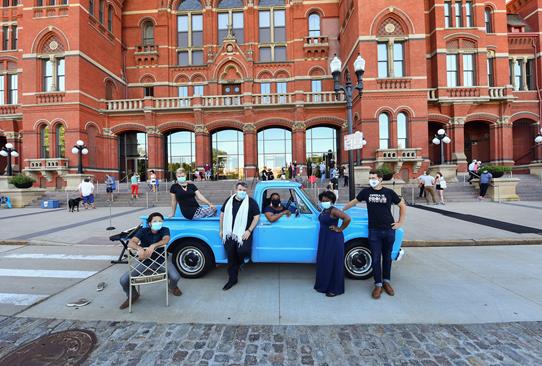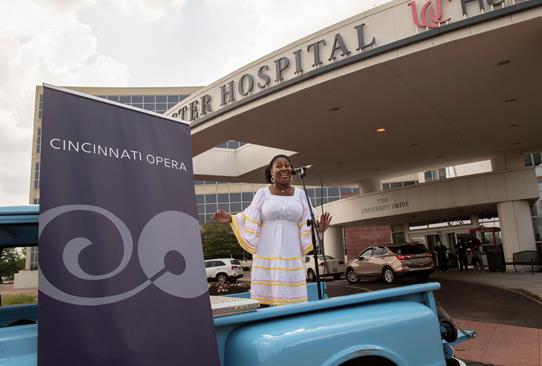Rallying Boards Around Reopening
The only thing worse than canceling an entire season is canceling your entire 100th anniversary season. That was the fate of Cincinnati Opera last year. But despite a postponed world premiere, the company is back this summer to offer a reinvented festival — not in its historical Music Hall, but outside for the Cincinnati community.
Marc A. Scorca, president and CEO of OPERA America, called Cincinnati Opera’s board president, Liz Grubow, to talk about how good governance contributed to the company’s resilience.

MARC A. SCORCA: Cincinnati Opera has followed a set pattern of production activity for decades. Your board is accustomed to making decisions within a narrow range of options. But as you began to think about how to reopen after COVID, you were presented with making massive decisions around different scenarios. How did you lead the board in discussion and assessment of all the options before you?
LIZ GRUBOW: I think it was key to enroll board members in the process. As it became obvious our 2021 season couldn’t proceed as intended, that’s when we said, “Okay, so what is our plan?” We put together an ad hoc committee of board members to work with the staff to develop scenarios. Then we presented these back to the board. We wanted everyone to feel “We’re all involved, we all have skin in the game.”
MARC: What made you decide to form an ad hoc committee or taskforce, rather than give the task to the executive committee or to the full board from the start?
LIZ: We have a large board and wanted to ensure that everyone was engaged and heard. We considered how to bring together a group to start thinking about this: What were the skill sets, the ages, the diversity of opinions? We really wanted to feel that we covered the bases and all constituents were engaged in the discussion.
MARC: How did you engage the full board in evaluating the scenarios?
LIZ: We used breakout rooms on Zoom to get feedback: What do you think? What are the challenges? What other thoughts come to mind? Each group included an opera staff person, and then we reported out from our group discussions to the full board. People were so energized. Lots of things were brought up that we didn’t think about: Do you ask for payment or is this free? What would transportation be like? Would there be facilities? Our board members were tracking with us. When one option fell through, we would talk about why and then move on to the next. We really got tremendous investment in the journey.
MARC: I imagine you had a high level of board attendance via Zoom, and the breakout rooms probably made it easier to engage folks in small group discussion. Was Zoom a helpmate in all of this?
LIZ: It was a tremendous one! We’ve done breakout rooms a number of times throughout the year. We’ve found a lot of board members get to know each other better in these small groups. They miss coming together at meetings where we could catch up and talk in person, so this took its place. Outside of board meetings, we’ve also had groups get to know more about each other in small virtual discussions with five or eight people. That’s how we kept connecting with new and current board members.
MARC: You mentioned that your board was “energized” in this active discussion. It makes me wonder: Does the regularity of programming and decision-making at our companies lead to board member disengagement? Has the crisis actually energized us?
LIZ: I think the crisis certainly has. There was a determination to protect the organization and its people. Also, what were we going to do to help the artists? We initiated a campaign to establish an Artist Relief Fund. Through a matching gift from The Harry T. Wilks Family Foundation, Nanci Wilks Lanni and Nick Lanni, and Barbara Wilks, along with the generosity of our subscribers and donors, the company raised substantial funding to provide important relief to more than 300 artists whose livelihoods were affected by the season cancellation. It was a way to focus us immediately on doing something good.
MARC: I haven’t heard that before, that at that moment of cancellation and associated disappointment, there was a chance to rally around something positive.
LIZ: Another important inflection point for us was around the killing of George Floyd. That was just so horrific, and we had to reflect as a company and a board: the public Black Lives Matter statement; amazingly frank dialogues; a series of conversations hosted by our young professionals group, the Center Stage Board Associates; trainings with board and staff; reading books together. It was really important, and it was something to focus on in a positive way. What can we do as a company? What can we do as individuals?
"Uncertainty is part of the creative process."
MARC: Under Cincinnati Opera’s leadership, there was always a level of certainty. If staff said you could reach a goal, you knew they could deliver. But right now, you’ve been living in complete uncertainty. How did you help board members get comfortable with that?
LIZ: I think there are a couple of things. One is I think we have an amazing board culture. When you go on different boards, you have different experiences. Some are very formal, some are very loose. I think our opera board is collaborative, leans into things, enjoys the work, and enjoys each other’s company.
The other thing is uncertainty is part of the creative process. In my work as a creative director at a marketing consultancy, we’re always faced with uncertainty. Whenever you create, you have a vision, but then it doesn’t always work out that way. That behind-the-scenes reality has become even more apparent to our opera board.
MARC: I think a lot of boards expect things to play out according to plan, according to budget. One of the discoveries through COVID is a new level of comfort with experimentation: “We don’t know if this is going to work. Let’s try.” And it seems to me that an attitude of experimentation, rather than certainty, is more compatible with the artistic process.
LIZ: Yes! I think it’s also interesting that there was a cadence to how things evolved. We experimented a little bit, and then we gained momentum as we figured things out. It wasn’t all at once.
Our general director, Chris Milligan, established a program led by the entire staff called Remote Engagement and Service Initiatives (RESI). The challenge: Let’s come up with new ideas, let’s do things differently. It was a bonding experience for the staff, it was cross-functional, and it led to creating programs such as the Share the Love Truck performance tour, Virtual Opera Chats involving artists and their ideas for programs, and other activities and events in the community.
So, the staff was creating, and the board was supporting; we were all working together. And the fact that it was our 100th anniversary, too, compelled us to make it as special as possible. All along, my charge to the staff and to everybody was, “Let’s not talk about what we can’t do. Let’s talk about what we can do.” That has been the theme through this challenging year.


MARC: Of course, you’ve announced your 2021 season. It’s outside in Summit Park.
LIZ: Yes, we’re really excited. It’s going to be a whole different experience, and I’m really looking at this as our chance to reach out to people who may not have thought about the opera. This could welcome our next generation of opera lovers.
MARC: Another example of a hidden opportunity within the crisis.
LIZ: Absolutely, everybody is just thrilled. I think part of what was so difficult last year for the staff (and board) was that the summer festival, this intense four-month period where there aren’t enough hours in the day, was gone. Everybody is longing to get back to that work.
MARC: Can we expect summer ’22 to be back in Music Hall? Are there elements of the work of the last year — Zoom meetings, breakout rooms, the spirit of experimentation — that you will continue in some fashion, even as things might become a little more normal?
LIZ: Well, we have to think in a hybrid model. I think that’s going to be very important. We’ve all found the technology to be a benefit, in how our board functions and in reaching more people with the work of the company. I expect we’ll have hybrid meetings, where those who want to come in person do, and we’ll have Zoom for others. We will continue to develop virtual and digital programs, and then I see us continuing to partner with other organizations in the city — the Playhouse or the Symphony — to collectively share the expertise and the equipment for producing and streaming live events.
MARC: That’s a very good thought. If communities develop some kind of technical team that can be deployed across arts organizations, it benefits everybody. No one organization is going to do so much that they need to have that team full time. And the hybrid meeting is something we’re going to have to practice. Can we run an effective meeting where some people are on Zoom and some people are in the room? Once again, it’s that culture of experimentation that we’ll have to lean into.
This article was published in the Spring/Summer 2021 issue of Across the Board, a publication of OPERA America for opera company trustees.




